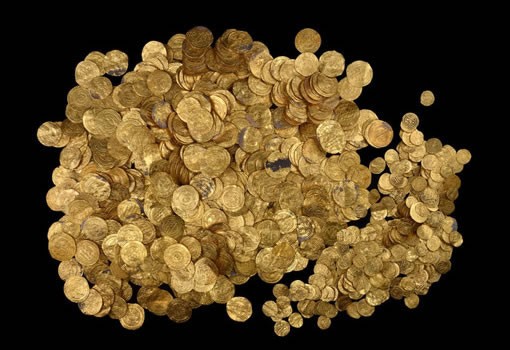Members of a local diving club in Israel made a surprising find when they accidentally discovered nearly 2,000 gold coins from the 11th century.

Touted as the largest treasure of gold coins ever discovered in Israel, the hoard was found on the seabed in the ancient harbor in Caesarea National Park. The 11th century Fatimid period coins included dinar, half dinar, and quarter dinar denominations, according to the Israel Antiquities Authority.
Perhaps as surprising as the find itself, the condition of the gold coins is remarkably good.
"The coins are in an excellent state of preservation," said Robert Cole, an expert numismatist with the Israel Antiquities Authority. "Despite the fact they were at the bottom of the sea for about a thousand years, they did not require any cleaning or conservation intervention from the metallurgical laboratory."
Divers initially found just one coin and thought it a toy coin from a game. After closer scrutiny, several more were collected and shown to the director of the dive club. The Marine Archaeology Unit of the Israel Antiquities Authority was notified and the entire hoard was recovered.
No one knows for sure the history of the treasure, but several theories have been voiced.
"The discovery of such a large hoard of coins that had such tremendous economic power in antiquity raises several possibilities regarding its presence on the seabed," said Kobi Sharvit, director of the IAA Marine Archaeology Unit. "There is probably a shipwreck there of an official treasury boat which was on its way to the central government in Egypt with taxes that had been collected."
Another theory speculates that the coins sank as part of a large merchant ship that traded with area coastal cities.
A detailed description of the treasure indicates that the oldest coin found is a quarter dinar from the second half of the 9th century, struck in Palermo, Sicily. The bulk of the coins were minted in Egypt and North Africa in the years ranging from 996-1036.
Israel’s Law of Antiquities states that all antiquities are properties of the country. Not reporting the find would have been punishable by up to five years imprisonment.





